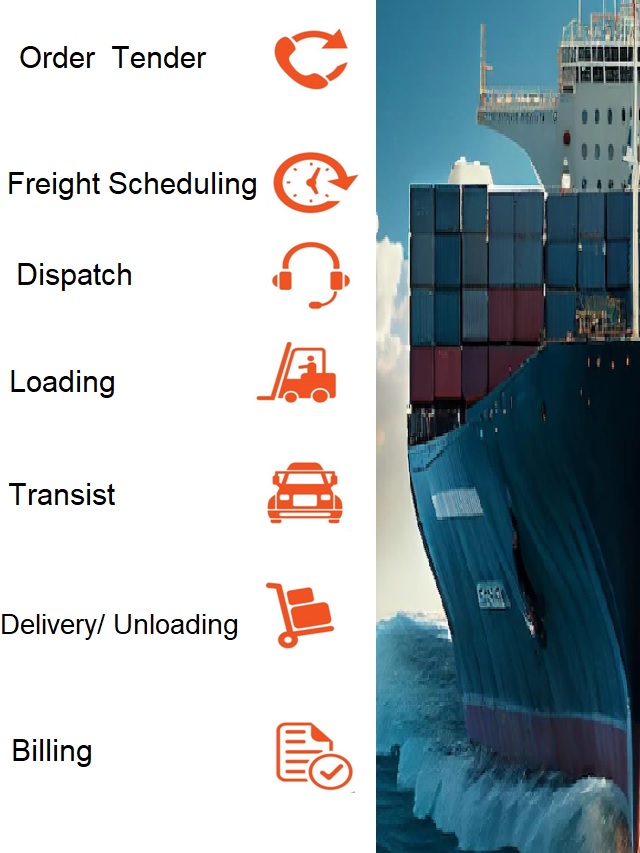About Freight Broker
An important middleman in the logistics and transportation industries is a freight broker. They are essential in establishing connections between shippers (businesses or people who need to carry goods) and carriers (trucking firms, freight firms, etc.) to guarantee the efficient transportation of goods from point A to point B. A freight broker performs a variety of duties, such as the following:
- Matchmaker and intermediary.
- Load Matching.
- Negotiation.
- Freight Booking and Documentation.
- Logistics Management.
- Market Insights.
- Risk Management.
- Diverse Services.
- Relationship Building.
- Time and Cost Savings.
- Small and Large-Scale Operations.
The life cycle of LOAD
How does a freight broker make money?
who is the shipper?
- producers of the goods.
- Logistics Planning.
- Contracting Carriers directly.
- Contracting Freight Brokers.
- Documentation and Compliance.
- Supply Chain Efficiency.
Who is the carrier?
- Transportation Execution.
- Diverse Modes of Transport.
- Capacity and Flexibility.
- Cargo Handling and Safety.
- Timely Deliveries.
- Tracking and Communication.
- Documentation and Compliance.
- Pricing and Negotiation.
- Collaborative Partnerships.
- Efficiency in the Supply Chain.
Carriers in the freight brokerage business are ultimately responsible for the physical movement of commodities which can be heavy-duty or lightweight Carriage. The responsibilities they have include compliance, communication, monitoring, Honesty, and teamwork in addition to providing a range of transportation options like Fatebed, Less than truckload (LTL) Freezers Full Truck Load Carriers and brokers must collaborate in order to create a seamless logistics ecosystem that supports local, national, and worldwide trade.
What needs to be done to set up a Freight Brokerage Company in the USA?
There are many processes involved in establishing a freight brokerage company in the USA, including operational, financial, and legal issues. Here is a general description of what is needed.
Research and Planning:
- To understand the demand for freight brokerage services in your target market and industrial sectors, conduct in-depth market analysis and research.
- Decide on your market niche and choose shippers and carriers as your target clients like the sectors you are comfortable with.
- Make a thorough business plan that details the goals, plans, budget, and organizational structure of your organization.
Legal Considerations:
- Select a business legal structure (such as a sole proprietorship, LLC, or corporation) and register it with the relevant state agencies.
- For tax purposes, get an Employer Identification Number (EIN) from the IRS.
- Submit an application for any licenses or permits that are required by local, state, and federal authorities. The Federal Motor Carrier Safety Administration (FMCSA) requires freight brokers to register with them and acquire a USDOT number.
Insurance:
- Obtain insurance for freight brokers, such as a surety bond or trust fund. Brokers are required by the FMCSA to carry a least $75,000 surety bond to demonstrate their financial accountability.
Planning your finances:
- Obtain finance for your company, which may cover startup costs, ongoing costs, marketing charges, and technology investments.
- To manage finances apart from personal accounts, open a business bank account.
Infrastructure for technology
- Technical Support Infrastructure:
- To efficiently organize orders, track shipments, and handle paperwork, invest in transportation management software (TMS) or freight brokerage software.
- Create an accessible website and online presence to draw customers and enlighten them about your offerings.
Marketing and Sales:
- Create a marketing plan to connect with potential clients, like shippers seeking transportation options.
- Make a logo and marketing collateral that represent your brand.
- Connect with potential customers by utilizing social media, web marketing, and networking occasions.
Compliance and Education
Make sure you and your personnel are familiar with the rules and regulations outlined by the FMCSA and other pertinent authorities.
Operations:
- Make sure your staff members have received training in customer service, negotiating, and industry best practices.
- Create effective procedures and protocols for managing orders matching shippers and carriers, and tracking shipments with tools like roserocket software.
- Create a system for maintaining track of papers like contracts and bills of lading payments with carriers and shippers
Maintaining Quality
- Maintaining a high standard of customer service can help you gain the trust and enduring relationships of shippers and carriers regularly calling and updating each other is the key to success.
- Keep an eye out for opportunities to improve your operations and service.
















0 Comments